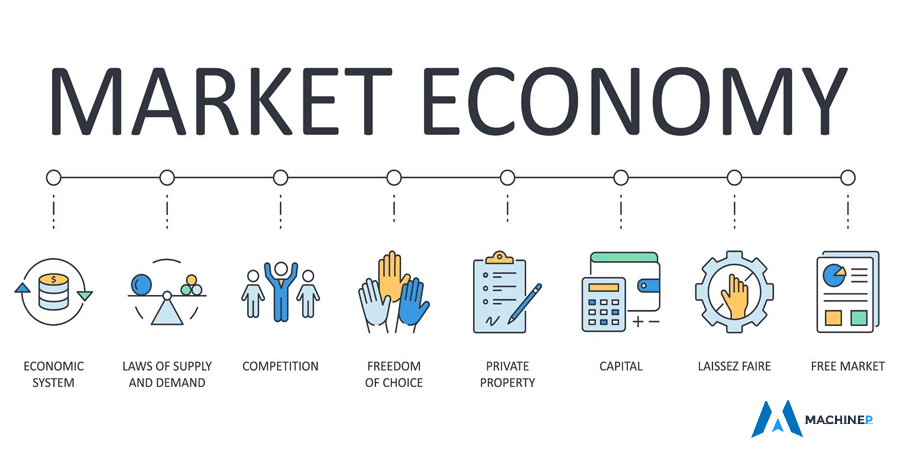Introduction
The center focus of the free market economy is that the demand and supply chain does not have the government exercising overt control. There is a strong agreement between scholars of this ideology that production should be a thing for private entities.
Definition of Free-market Economy
In definition, a free-market economy is a system where individuals have the freedom to produce goods and services as demanded by the market system with little or no government control. In a free-market structure, those who are willing to take articulated risks to respond to the market demand, offering creative inventions are highly rewarded.
Scholars’ Contribution to Free-market Economy
In contributing to this theory, different scholars have elaborated research works to broaden the scope of its study. Ayn Rand and Adam Smith are very influential among this group and are seen as one of the best crusaders of free-market thinking. Rand is a supporter of Adam Smith’s “Laissez-faire” which means to allow government remove their hands from the market; and rather play the role of a well-meaning government which is to uphold justice, law, and order.
In comparing and contrasting, both Adam Smith and Ayn Rand supported the free-market economy. For Rand, her conception of the inalienable natural rights informed her belief that private property must be protected. While for Smith, private property protections could be overridden given peculiar instances.
From the perspective of Ayn Rand, the role of government is to protect the rights of persons, therefore such – and only such should they do inadequately providing security for the property rights of individuals. She believes that the phrase every “common good” is a “meaningless concept”, she said that man is in a relationship voluntarily.
She was one who held a strong opinion of rationalism being is the only thing capitalism demands of an individual because according to her it is only rational people that get rewarded by capitalism.
The main features of Ayn Rand’s position
- Intrinsic; she was a believer in the notion that ‘good’ is inherent in individuals and their actions. Therefore they should be left to exhibit that intrinsic nature
- Subjectivism: Ayn Rand viewed all values to originate from man’s consciousness and not some involuntary relationships and actions.
- Objectivism: to Rand, good is an evaluation of reality by consciousness. The individual, in taking decision on what is felt to be good, basis opinion on what the conscious reality is.
Rand maintained that no other economic system apart from capitalism {free market} has profited mankind. According to her, the free market is the only morally valid socio-political system that allows people the freedom to act maximizing self-interest.
Adam Smith Position on Free Market Economy
Popular for his work, “Wealth of Nations”, Adam Smith opined that the central pillars of the market system are:
- Exchange of processes,
- Privatization goods and services
- Economic value systems
- Self-interest
- The invisible hand
- Economic role of the producers, consumers, investors, and employees
- the sovereignty of the consumer
- Profit and rewards
- Institutionalizing business
- The operating principles of efficiency, productivity, and growth.
For Smith, the father of Economics, the invisible hand speaks of the division of labor and the pursuance of self-interest as the main human motivation. He opined that for the maximization of profit and goods and services, effective and efficient production is gotten through individuals working on the basis of.
Adam Smith emphasized, the sovereignty of the consumer in the free market because they have their purchasing power.
Similarities Between the Free-market Economy Postulations of Adam Smith and Ayn Rand
There is quite an obvious similarity between Adam Smith and Ayn Rand’s ideas on the subject. Some of their similarities are highly to be;
- Their focus on the running of an economy by individuals and not the government.
- The two parties so much believe in the ability of individuals to work out things by themselves without any form of interference. To them government meddling in production is a hitch in the economic growth of, not only an individual, but the society as large.
Difference Between Adam Smith and Ayan Rand’s viewpoint
A closer assessment of the postulations of these two scholars will reveal some dissimilarities, even though, to some great extent, they look quite the same on the surface
The difference between the two ideas is that Adam Smith based his argument on individuals building themselves economically and the government continuing to play a diminishing role until there is out rightly no role played by the government.
On the other hand, Ayn Rand dwelt more on negating the efforts of the government towards her citizens economically. She was vehemently stated that the government had nothing to offer economic wise, therefore it should take their hands off the economic life of the state.
In conclusion, the free market encourages that individuals champion the production of goods and services.





Just a moment to appreciate your writing skills and the content.
i like this recommended post